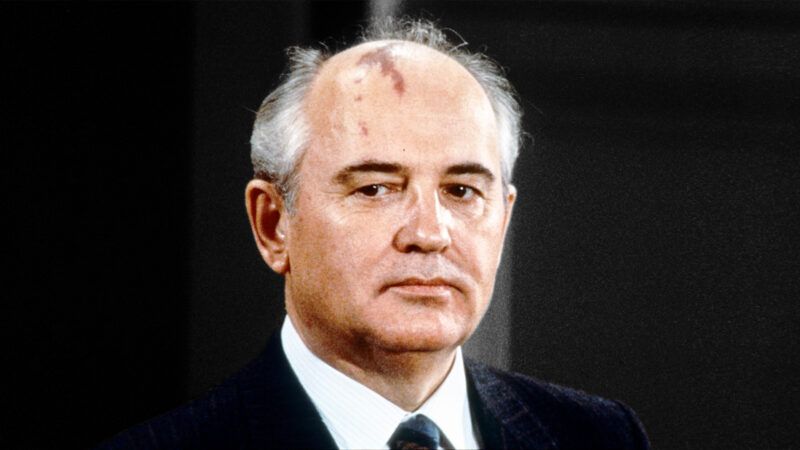It Wasn't What He Wanted, But Gorbachev Allowed an Evil Empire To Collapse
Alas, the Russians never forgave him.

If the late Mikhail Gorbachev had gotten his way, the world would look a lot different than it does now. Socialism would still be the dominant economic system from Leipzig to Yakutsk. The Warsaw Pact would still exist; a unified Germany would not, nor would the independent Baltic states. Above all, the planet would still be blighted by the wheezing and malevolent existence of what Ronald Reagan rightly described as "the evil empire"—the Union of Soviet Socialist Republics.
"I regret it to this day," Gorbachev said to Werner Herzog about the collapse of the Soviet Union. "It is hard." Poor thing.
Yet we should not judge the eighth and final Soviet leader, who died Tuesday at the age of 91, by his base geopolitical desires but rather by the glorious human flourishing that his actions—and especially his inactions—allowed to take place. Gorbachev's economically desperate late-1980s policies of glasnost (openness) and perestroika (reform) unleashed a whirlwind of freedom-seeking among hundreds of millions of captive peoples, quickly overwhelming any one man's (or regime's) ability to control it.
And during most—though definitely not all—key moments of potential armed conflict between dictatorial hardliners and outgunned revolutionaries, Gorby told the generals to stand down. This is an achievement worth lingering on and learning from.
History is not over-stuffed with examples of outstretched empires that withdrew into a more reasonable perimeter without putting up a bloody fight. Surely it helped in the decision making process that Moscow was dead broke and hopelessly outmatched in just about every competitive resource except oil reserves and nuclear weapons. Another perennially underrated factor in the comparative peacefulness of the Soviet collapse is that—contrary to the propaganda of both Vladimir Putin and Gorbachev himself—neither the newly freed countries nor their superpower protector sought the types of revenge historically typical among vanquishers.
The result was that, under the watches of both Gorbachev and George H.W. Bush, November 9, 1989 became the most liberating day of the most liberating month of the most liberating year in human history. Hardly limited to the long-suffering nations of Central Europe, the imperial drawdowns from both sides of the Cold War brought crucial and long-awaited relief to the proxy-war-scarred post-colonialist countries of Africa and South America. The fact that Gorbachev planned for almost none of this should not dull our appreciation for him not getting in the way.
That asteroid-level event of totalitarian destruction comes with a takeaway for the United States—the world will be more free, and self-governing, after the United States stops assuming responsibility for its security arrangements.
But as we've also seen during the past six murderous months, the nation of Russia has never allowed the perceived wound of its imperial amputations to heal. There could and should have been a real post–Cold War settlement, just as there have been major international agreements about borders, populations, and security arrangements following every significant geopolitical conflagration. But alas, all sides to that 20th-century-defining conflict squandered that opportunity.
Gorbachev was no help in that process, nurturing (whether authentically or in the name of domestic reputation-salvaging) the kind of sullen nationalist paranoia that Putin would make his whole raison d'être. The world lives daily with the disastrous downstream results.
But it's hard to communicate to those who weren't there what better times his birthmark-decorated forehead once foretold. From affable acceptance of the winds of change to cameos in Wim Wenders movies to his iconic role in a Pizza Hut ad, Gorbachev felt like—and was—a marvelous transition figure from Brezhnevian totalitarianism to this new thing that was being birthed in the 1990s. It was a naïve (and neoliberal!) vision, sure, but it was more hopeful than the world Gorby now leaves behind. RIP.
